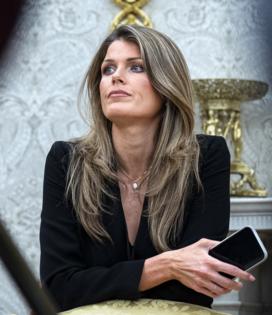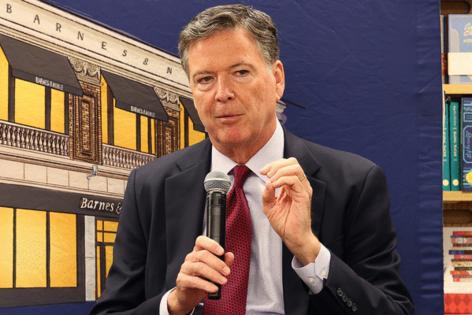Judge questions grand jury procedure in James Comey indictment
Published in News & Features
WASHINGTON — The grand jury never voted on the final indictment against former FBI Director James Comey regarding Senate testimony, prosecutors said Wednesday, prompting a federal judge to seek more information about whether the indictment was valid.
The admission came as Judge Michael Nachmanoff of the U.S. District Court for the Eastern District of Virginia asked questions at a hearing over Comey’s effort to dismiss the indictment as a vindictive prosecution directed by President Donald Trump against a prominent critic.
Nachmanoff ordered both sides to address the grand jury process in court filings later Wednesday, and referred to a case known as Gaither v. U.S.
In that case, the U.S. Court of Appeals for the District of Columbia Circuit ruled that a district’s indictment procedure violated federal court rules because it did not include approval of the indictment by the requisite 12 grand jurors.
Nathaniel Lemons, one of the prosecutors, said the grand jury was initially presented with a three-count indictment and voted down one of the three charges. Lemons said prosecutors then revised the indictment to reflect that vote, deleting one of the charges, and the foreperson signed it.
Lemons said the second indictment was “not a new indictment in any way whatsoever,” just a revision made to reflect the fact that the grand jury voted not to indict Comey on one of the three counts.
Interim U.S. Attorney Lindsey Halligan told Nachmanoff that the grand jury’s foreperson and one other grand juror were in the courtroom when the foreperson signed the revised indictment Sept. 25. That was days before the statute of limitations ran out on allegations Comey lied to Congress during a September 2020 hearing.
Michael Dreeben, one of Comey’s attorneys, said the admission shows the indictment should be dismissed because the grand jury did not vote on the indictment the government used.
“There is no indictment that Mr. Comey is facing that was returned before the statute of limitations expired,” Dreeben said.
Nachmanoff also separately had ordered the government to file its objections Wednesday to a magistrate judge order that would open up the grand jury proceedings, a rare move.
Comey served as the director of the FBI from 2013 until Trump fired him in 2017, amid a probe into Russian interference in the 2016 presidential election.
Prosecutors unveiled the two-count indictment against Comey in September, alleging that he lied to Congress about leaking to the press during a 2020 hearing. Comey has pleaded not guilty to the charges.
Vindictive prosecution
Wednesday’s hearing mostly focused on Comey’s argument that Trump directed the case as a selective and vindictive prosecution to retaliate against a critic.
Dreeben argued that Trump’s long history of public tirades against Comey, coupled with the last-minute moves to install Halligan as a prosecutor, meant the indictment should be dismissed.
“There has never before been a more blatant use of criminal process to achieve political ends,” Dreeben said.
Trump has long criticized Comey for his actions in starting that investigation into Russian interference since firing him as FBI director.
On Sept. 20, Trump posted on social media asking “Pam” — presumably the attorney general — why she had not yet charged Comey, Sen. Adam B. Schiff, D-Calif., and New York Attorney General Letitia James. Halligan has since charged James, as well.
Dreeben cited that post repeatedly to argue that Trump effectively directed the case be brought against Comey.
“If that is not a direction to prosecute then I don’t know what is,” Dreeben said.
Dreeben said Trump has set himself up as the nation’s top law enforcement officer, directing investigations at his whim. He also pointed to a Trump social media statement directing the DOJ investigate ties between Democrats and late convicted sex offender Jeffrey Epstein.
Dreeben said Attorney General Pamela Bondi publicly committed to opening an investigation despite a statement this summer that there were no grounds for such a probe.
Dreeben compared Trump’s statements to a lamentation attributed to English King Henry II — “Will no one rid me of this turbulent priest?” — ahead of the murder of St. Thomas Becket.
“Henry II can’t be binding on this court, but I take your point,” Nachmanoff said.
Lemons pushed back on Dreeben’s arguments, saying there was no proof Trump ordered Halligan to seek the indictment. “He was indicted because he lied to the Senate Judiciary Committee,” Lemons said.
Lemons claimed Comey’s arguments relied on “innuendo, conjecture and interpretation of past events,” such as news reports about a decision by prior interim U.S. Attorney Erik Siebert not to pursue the case.
However, Nachmanoff questioned Lemons on whether the court could consider Trump’s statements about the case, or his exhortations that prosecutors had to “act fast.” Lemons said the court could consider those.
Nachmanoff also pushed Lemons to explain steps he and Halligan took in bringing the case, including whether prior prosecutors had written a declination memorandum — a document laying out the reasons not to proceed with a case.
Halligan, a former personal attorney for Trump, was appointed to the role days before the indictment and was the only prosecutor to sign the indictment.
Nachmanoff also questioned how much analysis Halligan could have done on the case in the few days between her appointment on Sept. 22 and bringing the case Sept. 25. “What independent evaluation could she have done in that time period?” Nachmanoff said.
Separate from the effort to challenge the indictment as a vindictive prosecution, Comey has challenged the legitimacy of the appointment of Halligan. That process is still pending before another judge.
©2025 CQ-Roll Call, Inc., All Rights Reserved. Visit cqrollcall.com. Distributed by Tribune Content Agency, LLC.










Comments